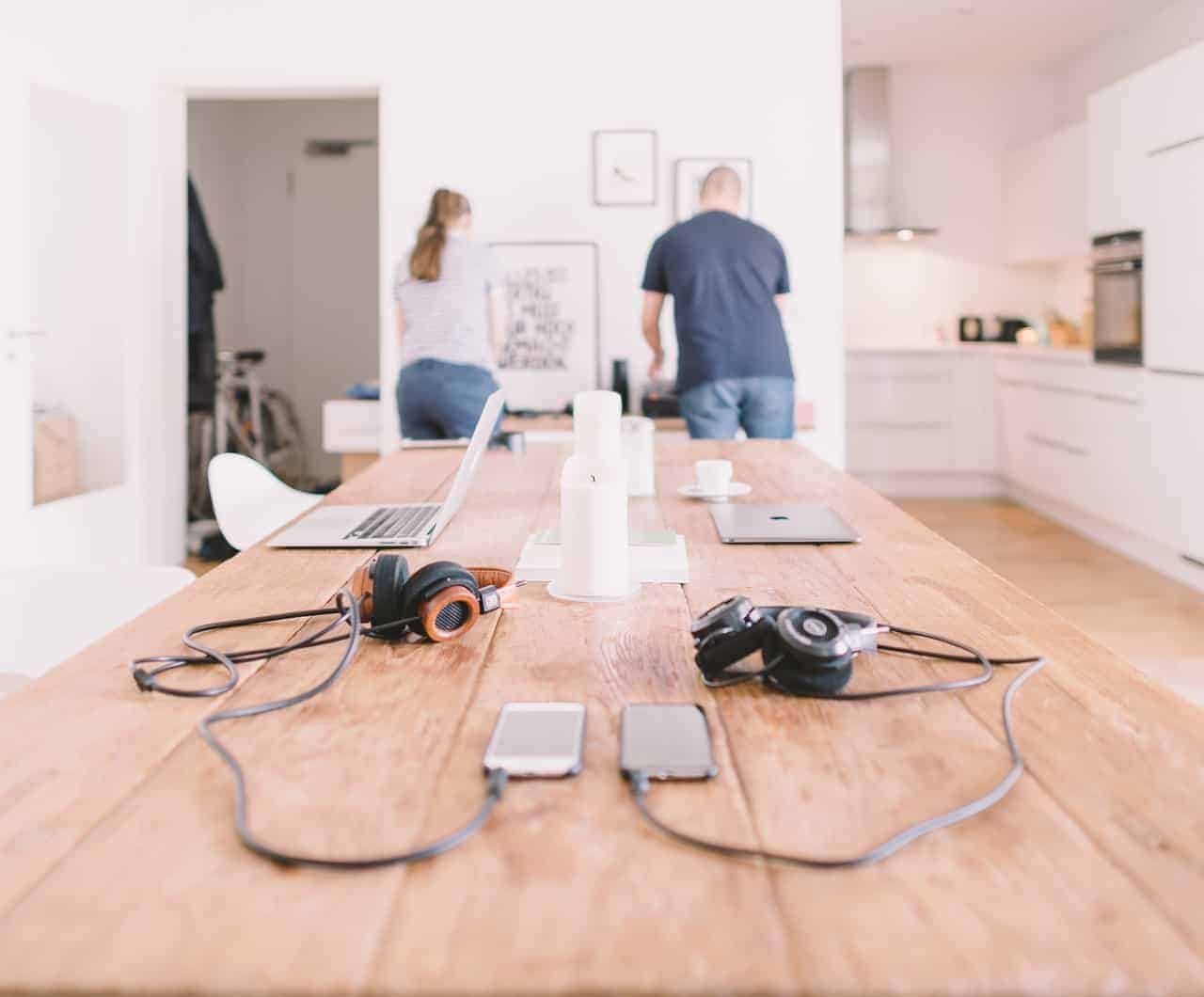Technology and relationships can be a hotly debated topic with different camps arguing for both the positive and negative effects of technology on relationships. The question in this post, however, is whether a couple can create a healthy relationship with technology, regardless of the pros and cons of technology in relationships. I want to suggest 4 ways a couple (or family) can do that.
If you’re like me, you most likely spend a lot of time on some form of smart device or computer.
Our phones are with us all the time.
Most of us spend a lot of time on social media or looking at our messages.
It’s become the norm and pretty much accepted all round for people to spend half their time focusing on the small screen well using the other half to pay attention to whoever is talking to them.
But, have you ever stopped and wondered: What are the actual effects of technology on relationships…your relationship?
Yes, there’s no denying that technology is making so many things possible that we would never have imagined, but hoped for e.g. in the medical field.
Yet, there is a reaction to every action.
And I can’t help but wonder what exactly are the effects of technology on relationships, and also the long-term impact on our relationships.

Think for a moment, do your family dinners revolve around everyone staring at their phones (or some other screen)?
How do you reckon that’s affecting your family?
What if you go on a date with your partner?
To find yourselves spending more time looking at your smartphones than actually talking to each other?
How does that affect your relationship?
Connection?
Intimacy?
Here’s a true story …
My family and I went out for dinner one night to a local Irish pub.
While we were sitting at a table waiting for our order, a young couple sat down at the table next to us.
And like clockwork, they instantly took out their phones and started doing what most people do on it …
Having been married for a while, I could tell that this was either a first date or second, but they were clearly still checking each other out.
So one would expect people being interested in one another to use the opportunity to actually talk and get to know each other, but not these two.
Now, in all fairness, the young lady was clearly more willing to engage in conversation than the young guy. He was glued to his screen.
After they ordered their drinks, they continued to exchange a few words, during which time the young guy never put his phone down or looked up at her for more than two seconds.
He was clearly having a conversation with someone else via texting …. probably telling some mate about how hot his date looked.
After a while, my wife and I could see that the young lady was starting to get slightly annoyed and detached from this “date.”
She clearly thought about the date as she was well dressed, make-up was done nicely and some effort went into her hair …
The guy on the other hand … well … let’s just say he probably could have made a bigger effort …
She also actually put her phone down and was clearly interested in making conversation with him, but the young guy was so focused on whatever was happening on this phone, that he completely missed the fact.
After about 20 minutes or so, he excused himself and went to the bathroom. Still with a phone in hand.
At that stage, it was fairly evident that she didn’t want to be there anymore, but they’ve already ordered so it only made sense to wait for their food.
We left before they did, so not sure if he got the “goodnight kiss” or not :)

The sad thing about this incident is that it is by no means isolated. It happens all the time.
In fact, my wife had a very stern conversation with me about the very thing a while back.
She pointed out to me that I was spending too much time on my phone while we were having lunch somewhere, and it made her wonder what the point was of going out for lunch.
Now, I do know if you’ve ever been on the receiving end of this, but she had a point.
I know how I feel whenever somebody shouts me coffee and end up taking a phone call midway through, leaving me sitting there playing with my thumbs and looking around awkwardly.
It isn’t great or fun.
Here’s the point I would like to make today,
if you let it run rampant, the effects of technology on relationships can seriously harm family bonding and create even bigger challenges in your relationship’s long-term.
Yes, there are positive effects of technology on relationships, like being able to send your wife some cute or “naughty” text at any time, but left to its own devices technology can do more harm than good.
And although we can’t hide from technology, you can keep it from driving a wedge between you and your loved ones.
How?
Good question.
4 Ways to Create A Healthy Relationship with Technology As Couples
Establish technology rules for meals.
One of the biggest complaints among couples and families is the interference of technology during meals at home (or when dining out).
In a world where people are always connected, both partners in couples tend to work or run their own businesses, and there never seems to be enough hours in the day, meals may be one of the few times you see your spouse or family members during the day.
However, Smartphones, tablets, and other devices can easily find their way into this most important time and distract us from having conversations, interacting, and connecting with one another.
So what can you do about it?
One of the easiest ways to handle technology during meals is to ban it from the table.
That’s assuming you have meals at some sort of table or breakfast bench.

Encourage your family members to check their phones and take care of messages before they sit down to eat.
Once they’re at the table, they should avoid technology and keep their phones in another room, and preferably silent which will reduce the temptation to check any alert.
Initially, this might be hard, but it doesn’t take long to get used to it.
In fact, we live overseas and far away from our family, and there is a big-time difference between South Africa and New Zealand.
Yet, if any of them call us on Skype during “mealtime” in the evening, we don’t answer but will call back later.
It’s important to give technology its proper place in our lives.
It’s there to serve us and not us that.
We have to be smarter than our smart devices by using them more smartly.
Create technology rules for bedtime.
One of the other effects of technology on relationships is the interference of devices with bedtime and our sleeping patterns.
These devices interfere with sleep habits and make it more difficult to settle down.
The glare of many screens also messes with our levels of melatonin which prepares us for sleep.
Checking your social media updates late into the early morning hours is not great for your health and productivity the next day.
I appreciate that many of us use our smart devices to read books.
But, in that case, it’s probably a good idea to download some screen filters to protect your eyes and minimise the impact of the screen on your sleep.
A better idea, however, would be to read an actual book or finish reading a chapter in a better lit room, before retreating to bed.
The ideal is obviously to make a rule that doesn’t allow devices to be used once a person is in bed.
This is particularly helpful for dealing with children who like to play on their phones or read from tablets while in bed.
They definitely need their sleep, as do adults.

You also want to avoid using technology at night and replace it with real conversations.
The evening provides an important opportunity to discuss important topics and spend quality time with your partner.
It’s also possible that having devices in bed can impact your intimacy.
It’s very difficult to “get in the mood” while both partners are staring at their own individual screens with earphones in their ears watching funny cat movies on YouTube.
And while we’re on it, get the TV out of your bedroom.
I appreciate that this is a very difficult issue for many couples as we’ve become so used to sharing our bedrooms with technology, but the effects of technology on relationships and intimacy are real and perhaps something to consider more seriously.
Establish rules for passwords.
I’ve worked with couples in the past we this particular issue has been a huge problem.
The issue of passwords.
Passwords can create issues in relationships with couples and family members who share them or refrain from sharing them.
First, create password rules for your children.
It’s important to teach them about password safety and security.
Depending on their age, you may want to request copies of their passwords to monitor how they use technology.
Secondly, Couples who share passwords with each other also need to establish boundaries.
Like I said earlier, I’ve seen some couples turned this into a fairly big issue within their relationship.
And it goes both ways.

On the one hand, you might have partners feel that they should know your passwords because there shouldn’t be any secrets.
Also if you’ve got nothing to hide, why keep passwords from them in the first place?
On the other hand, there might be sensitive information on a device that you would like to protect as much as possible; even from your partner.
Say you’re a therapist that keeps some of your notes of sessions on your tablet; that would need to be password protected from anyone due to confidentiality.
So, there are arguments both ways when it comes to couples and passwords.
I think, in terms of kids there should be a no-brainer.
Our children don’t have the passwords to our devices or computers or the parental control on our TV services.
But, in terms of couples, this is one that you and your partner will need to discuss and agree to some workable rules around this.
That’s the best way to ensure that this doesn’t become a problem it shouldn’t be.
Create social media rules.
The effects of technology on relationships can be seen in the biggest way when it comes to social media.
It impacts many couples in major ways.
This is not the time or place to go into all the intricacies and influence that social media can have on a relationship, especially of young couples, but there are a few principles to adhere to.
In my opinion, your first priority in your social media rules is to keep safety and your family’s wellbeing in mind.
Family members need to be aware of the data they share online.
Personal information such as addresses, phone numbers, bank accounts, and more don’t belong on social media; unless it’s business-related.
This probably goes for your kids more than your partner, but it’s good to have an understanding as a family of what you share online and whatnot.

Families these days use social media to interact with each other.
It’s convenient and easy.
And if you have family living abroad, it’s the fastest way to share pictures of the kids and your latest adventures.
That obviously extends to friends also.
It’s just an easy way to “stay in touch.”
But, although it’s convenient and easy, you also want to ensure face-to-face interactions and normal conversations still occur.
Social media can’t replace these human contacts.
Additionally, social media has also made it very easy to create a parallel life.
Technology has made it possible for us to recreate ourselves online in any way we want to.
You can adopt whatever persona you want.
That creates the possibility for a myriad of problems, whether you’re single or not.
On the one hand, it can create the temptation to cheat and ruin a relationship, because it’s become so easy to connect with anyone anywhere in the world.
And because it’s online, it’s also very easy to justify that it’s “not real” or it’s “innocent,” therefore OK.
But, I would argue that any emotional connection is real.
Even the illusion.
Anything that detracts from your relationships by default doesn’t add to it.
And that’s a problem.
On the other hand, being someone far less “appealing” in the real world could create feelings of personal dissatisfaction and low self-esteem in your “real” relationships.
Escaping to the online world becomes the natural choice whenever there are issues or life gets too much.
However, this can have devastating effects on your marriage or relationship.
Technology has made it very easy to “escape” to an “alternative reality” which on the one hand makes it easier to cope with your feelings, but consequently create even more emotional issues due to the fact that nothing ever gets resolved.
To simply escaping to a world that doesn’t exist, yet is very real, could create very serious problems later on.

So, before you or your partner use social media, be aware of the temptations that exist; especially if you’re having relationship troubles.
It’s also important to be aware of how sharing and tags work on different social media platforms.
Your pictures, ideas, and words can be shared by anyone, so you want to be careful about the information you post.
Especially of your children.
A last rule of thumb when it comes to using social media would be this: never ever use social media as a platform to resolve any conflict with your partner.
Washing your laundry in public is neither classy, respectful nor effective.
It only creates more problems.
Last thoughts
Technology is great.
It’s an awesome tool and vehicle for doing some amazing things.
But the effects of technology on relationships are real and can be harmful.
It can also never replace actual human interaction.
So, even though it’s a great tool, you have to be aware of the effects of technology on relationships, meaning the pros and cons of technology and relationships.
Yes, there are positive effects of technology on relationships, but it can also be a massive source of interference and disruption in your relationships.
However, by following the above-mentioned tips, you can reduce or prevent that impact without hurting your family or friends.
I hope you found this helpful.
If you liked this post please leave a comment below or share it with your friends.
Keep loving openly and fully!


